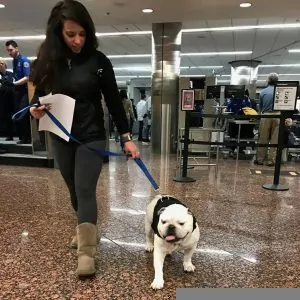By Nicole LaForest, BSc., LVT, RVT, CCFT, WSAVT President
Across the US, there are a small, but thriving number of us veterinary professionals that offer ambulatory services and ambulatory veterinary medicine.
What is an ambulatory practice you may wonder?

Ambulatory services may include cardiology, neurology, dentistry, surgery, imaging; such as ultrasonography and more. Ambulatory providers do not only include Veterinarians, but credentialed technicians and assistants, as well.
How does ambulatory medicine differ from mobile services?
It really can be as simple as verbiage, or it can be dependent on state law. Oftentimes mobile veterinary practices/providers are legally considered to have a facility on wheels that they treat and heal patients out of. This can include a van, bus, RV or other likewise converted vehicle. Before ‘branding’ yourself or a vagabond provider, check with your territory or state laws before doing so.
Why is providing an ambulatory service important?

Why should your practice have ambulatory providers?
Being able to stay in the loop with your patient’s care should be top on your list. No longer will you have to play phone tag with the other facility to get an update from their staff or records. In accordance with state laws, the original records may not leave the premise of where the service was provided, another way being mobile differs from ambulatory. Another plus is that you get to supplement you; the hosting practice, with interesting cases and additional revenue. Instead of referring your patient to a specialty center for a pricey TPLO, save your client some money and open your doors to an ambulatory provider that can offer the same care for much, much less. Most invoices are split 50/50 between the hosting facility and the ambulatory provider. Not too shabby for loaning your operating room to another provider for an hour or so, right? Meaning your practices revenue, and potentially commission; increases! Dare to break the daily mold by bringing in outsiders to provide care at your facility. You never know what you may learn from one another.
When should you refer to a standalone specialty or emergency center?
When the hosting hospital does not have the necessary equipment, medications, biologics or staff to care for the patient effectively or when the case becomes to personal. As in, is there concern over the presence of potential malpractice that you feel the pet should really have advanced imaging or a work up prior to surgery? Should the pet be monitored 24/7 after their procedure? What about a blood transfusion? These are just a few instances that need to be factored in prior to electing for surgery at your veterinary general practice.
What are the other benefits that come with an ambulatory service?

What are the risks that come with an ambulatory service?
There’re not too many risks that differ from that of a brick and mortar facility. Oftentimes, these types of practices do not have set schedules. If a pet develops a rare post-operative complication, it can be difficult to wait until the attending ambulatory veterinarian is back in the area. Mild post-op complications are left up to the hosting facility. This is still an unlikely occasion, but can be cumbersome for all involved. If the attending ambulatory veterinarian had to go back in and re-exam each pet after surgery at every stage of recovery, fees would be much higher while their caseload would plummet astronomically. Being an ambulatory provider, it is important not to discredit the abilities of the referring veterinarian at the hosting hospital. They (you) are capable of doing so much. Our practice believes that trust Is one of the most important factors of any relationship; including trusting the abilities of the general practice veterinarian to recheck our mutual patients when applicable.
Where can I find out more about being in ambulatory medicine?
Check out my Instagram page, @veterinarytechnicians, to see what my practice is up to daily! Stay tuned to learn more about how you can get your paw in the metaphorical doorway of an ambulatory service.
Read the previous interview with Nicole – “A Nontraditional Story”
